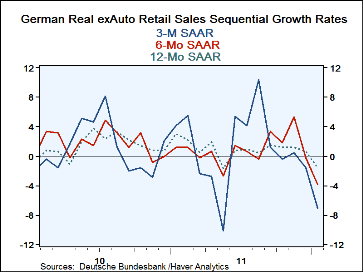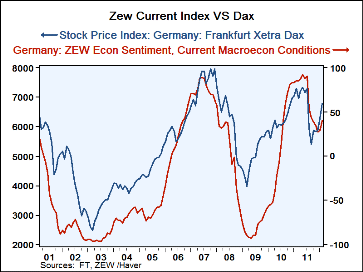 Global| Mar 02 2012
Global| Mar 02 2012German Retail Sales Show That Sinking Trend
Summary
German retail sales ex-autos have fallen for three straight months and have not risen in four months. In nominal terms sales are falling at a 6.4% annual rate but are dropping at a faster 7.1% annual rate in real terms. The [...]
German retail sales ex-autos have fallen for three straight months and have not risen in four months. In nominal terms sales are falling at a 6.4% annual rate but are dropping at a faster 7.1% annual rate in real terms. The progressive growth rates show that over short horizons the speed of the drop in retail sales is increasing. This is not good news and is contrary to the trend on the PMIs that have showed a tendency for firmness in the manufacturing sector over short horizons
Even though consumer confidence has been maintained in Germany consumers seem to be acting with more caution than they are showing when they answer the consumer surveys. The responses of the Zew survey and the IFO are showing some progress and, in the case of the Zew, the current conditions responses seem to follow closely the movements in the German stock market which have swung widely.
Taking cues from the financial sector is risky especially now when central bank actions are interfering so strongly with what the markets are doing. In the US the Fed is twisting the yield curve. That means that you cannot use the US treasury yield curve to give you market interest rate expectations and that you can’t infer future inflation expectations from TIPs spreads. In Europe the ECB is making bank loans plentiful under its LTRO program. With this liquidity, banks have become more aggressive buyers of their local national bonds and sovereign bond auctions have strengthened. All this really has done is to transfer and muddle bank risk with sovereign risk. We have no way of knowing if the market signals from better-bid auctions in previously weak markets are related in any way to improved sovereign circumstances. We need to be ever more vigilant of being lead to conclusions by the signals that distorted and manipulated markets are giving us.
This puts more emphasis on our analysis of economic data. And these data are becoming inconsistent.
| German Real and Nominal Retail Sales | ||||||||
|---|---|---|---|---|---|---|---|---|
| Nominal | Jan 12 |
Dec 11 |
Nov 11 |
3Mo | 6Mo | 12Mo | YrAgo | QTR SAAR |
| Retail Ex auto | -1.0% | -0.5% | -0.2% | -6.4% | -2.1% | 0.3% | 4.3% | -7.8% |
| car registrations (units) | -2.6% | 0.6% | 1.0% | -4.2% | -7.0% | -4.7% | 17.8% | -10.9% |
| Real | Jan 12 |
Dec 11 |
Nov 11 |
3Mo | 6Mo | 12Mo | 4.3% | SAAR |
| Retail Ex Auto | -1.6% | 0.1% | -0.3% | -7.1% | -3.8% | -1.6% | 3.0% | -9.5% |
| Other early reporters | ||||||||
| UK Nominal | 0.9% | 0.6% | -0.1% | 5.9% | 6.8% | 4.4% | 8.0% | 8.0% |
| UK real | 0.9% | 0.6% | -0.1% | 5.6% | 4.6% | 2.1% | 3.8% | 7.7% |
| Portugal-real | -11.1% | 9.3% | 11.1% | 36.1% | -29.0% | -10.9% | -9.5% | -11.8% |
Robert Brusca
AuthorMore in Author Profile »Robert A. Brusca is Chief Economist of Fact and Opinion Economics, a consulting firm he founded in Manhattan. He has been an economist on Wall Street for over 25 years. He has visited central banking and large institutional clients in over 30 countries in his career as an economist. Mr. Brusca was a Divisional Research Chief at the Federal Reserve Bank of NY (Chief of the International Financial markets Division), a Fed Watcher at Irving Trust and Chief Economist at Nikko Securities International. He is widely quoted and appears in various media. Mr. Brusca holds an MA and Ph.D. in economics from Michigan State University and a BA in Economics from the University of Michigan. His research pursues his strong interests in non aligned policy economics as well as international economics. FAO Economics’ research targets investors to assist them in making better investment decisions in stocks, bonds and in a variety of international assets. The company does not manage money and has no conflicts in giving economic advice.
More Economy in Brief
 Global| Feb 05 2026
Global| Feb 05 2026Charts of the Week: Balanced Policy, Resilient Data and AI Narratives
by:Andrew Cates








